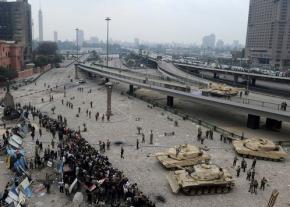A U.S. company arms Egypt’s tyrants
describes the warped priorities of a system that has millions to spare for the repressive Egyptian military but nothing for public schools.
IT'S SO outrageous, and yet so familiar.
Our friends and comrades in Egypt have taken a heroic stand, demanding that the Egyptian military dictatorship (the Supreme Council of the Armed Forces, or SCAF) step down and make way for a new civilian government to take power. In the course of this new revolutionary stage, the U.S.-backed tyrants murdered at least 32 people and wounded some 1,750 in the last weeks of November preceding parliamentary elections.
Since the elections took place, the SCAF has announced it will preside over the drafting of Egypt's new constitution because the new parliament "is not representative" enough of Egyptian society. Protests demanding the resignation of the military council erupted again in Cairo on December 16 and 17, resulting in the Army killing nine protesters and wounding 350.
In a statement issued on November 22 by the U.S. State Department, the Obama administration urged Egypt "to exercise maximum restraint" and "remain committed to nonviolence" in order to "protect the universal rights of all Egyptians."

Meanwhile, not only does the Obama administration stand by silently while police departments across the U.S. brutalize peaceful Occupy demonstrators, but the U.S. military recently awarded a weapons manufacturer $395 million to build 125 new tanks for the Egyptian military dictatorship. Talk about saying one thing and doing another!
This particular contract is a part of an estimated $1.3 billion tank package for the Egyptian military. Since the February 2011 revolution, the Egyptian military continues to be one of the Pentagon's closest allies.
In a July 2011 press release, the Defense Security Cooperation Agency, a part of the Department of Defense, stated that the tank deal "will contribute to the foreign policy and national security of the United States by helping to improve the security of a friendly country that has been and continues to be an important force for political stability and economic progress in the Middle East."
In other words, arming the military dictatorship will help the U.S. maintain its geopolitical grasp in the Middle East and not let the revolutionary spirit of the Arab Spring get carried away.
THE MASSIVE contract was awarded to a division of General Dynamics, the fifth-largest military contractor in the world, called General Dynamics Land Systems, based just 11 miles outside the city of Detroit.
Detroit is the most impoverished major city in the U.S., where 33 percent of the population lives in poverty and almost 50 percent are unemployed. Detroit's Mayor Dave Bing announced the other day that he was laying off 1,000 public workers and making deep cuts to city services in an attempt to balance the city's budget on the backs of the city's workers and poor.
While Detroit's relentless crisis continues to deepen, seemingly almost hopeless to resolve, the potential for a solution lays just outside its borders. Instead of spending $395 million to provide tanks to a brutal military dictatorship violently repressing its own population, the money and resources could be used instead for the benefit of society.
Instead of cutting city services, laying off public workers and privatizing Detroit's public schools system through chartization and laying off hundreds of qualified, capable teachers, the money could be used to rebuild Detroit's social and physical infrastructure. The money could be used to weatherize and secure people's homes for the winter, preventing the unnecessary deaths of dozens that occur every year and providing living-wage jobs to unemployed Detroiters.
This is just one stark and relevant example of the waste that capitalism and imperialism produces. While millions live in poverty across the country, scrounging for work, often working two or three jobs at 60 hours a week just to scrape by, or finding alternatives in an often dangerous and violent underground economy, our system privileges the interests of corporate profit and imperial dominance.
If the Occupy movement and the Arab Spring have taught us anything, it is that the power in collective struggle has enormous potential. For decades, media pundits and "experts" said that Egypt would forever remain a dictatorship--and that a revolution was impossible. "Experts" here in the U.S. said the same thing about young Americans. In 2007, the neoliberal pundit Thomas Friedman called young people in the U.S. today the "Quiet Generation."
Egypt, Occupy and the global revolt spanning from Athens to Bogota to London and beyond have shown that, despite what the "experts" may say, repression and inequality breed resistance. We have the power to force a massive change in the way this society is organized and what it prioritizes.
We have the power to change our society from one that is more concerned with military dominance and private profits, to one that plans democratically how we utilize the enormous resources we produce as a society, and serves and benefits everyone equitably. Harnessing that power lies in escalating and deepening our collective action and militancy, and building solidarity between the emerging global struggles.


